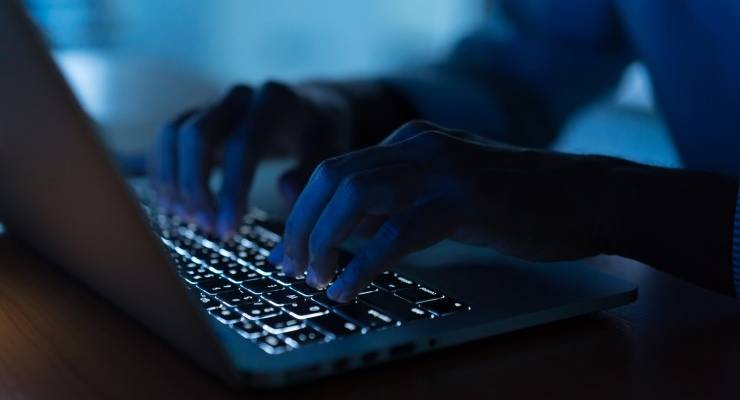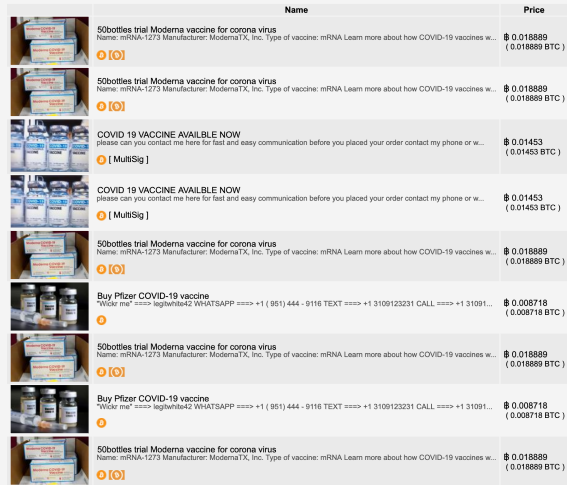
Illegal black markets on the dark web are being flooded with purported COVID-19 vaccines, with hundreds of listings found by Inq.
Australia’s ties to these marketplaces on the dark web (often called the deep web or darknet) are extensive. On Tuesday the Australian operator of DarkMarket, which is being called the largest illegal marketplace on the dark web, was arrested in Germany and the site shut down. Australia also has one of the world’s highest concentrations of darknet drug vendors per capita, thanks to the high prices we’re willing to pay.
It’s not the first time COVID-19 goods appear to have made their way to the black markets. At the start of the year, the dark web was flooded with stolen coronavirus-related medical products and supplies.
Open to manipulation
Australian National University regulation and global governance Professor Roderic Broadhurst tells Inq there’s been an increase in people talking about vaccines in dark web chats and forums — and some dark market vendors are moving to meet that demand.
Prices can vary from a few hundred to thousands of dollars in bitcoins or other cryptocurrencies. One expert told Inq they had seen prices as high as $4000 on one listing, with some reports putting the price as high as $24,000.

The dark net can’t be found using a conventional search browser like Google. To access it, users need to download software that keeps them and the computer anonymous.
Dark net marketplaces, which end in .onion instead of .com, are notorious for the sale of drugs, forged money, stolen or forged credit cards, anonymous mobile phone SIM cards and malware. There are at least 20 dark market sites currently online.
“Cashed up crime groups may be able to obtain diverted products along supply chain vulnerabilities,” Broadhurst said.
International security organisations including Europol and Interpol have warned organised crime gangs may hijack trucks containing vaccines, and that criminal organisations may be planning to infiltrate supply chains.
In April, Broadhurst’s team found 645 COVID-19 related product listings across 20 darknet markets, likely diverted or stolen from factories, stores and warehouses. The listings were mostly for personal protective equipment and antiviral medicines.
But many dark market sites have been selling purported COVID-19 vaccines, such as the one developed by Pfizer, since well before Christmas.
“As far as we can tell these are all scams,” Broadhurst said. Ads used stock images or mockups, while other vendors put more effort in, advertising their products as coming from Wuhan and being sent in temperature-controlled packaging.
It’s likely that vendors are trying to harvest personal information or simply take cash, Broadhurst added.
Not the wild west
Swinburne University criminology Professor James Martin told Crikey the dark web was not the wild west you’d expect, with rules and moral codes in place. Dark web sites universally prohibit hitman services, trafficked human organs and snuff movies, while bans on child pornography and controversial drugs like fentanyl are common, he said.

“The more dangerous the listing, the more heat you’ll attract from law enforcement,” Martin said, though added most vendors he had interviewed had a harm reduction focus.
“It’s been interesting to see how marketplaces have responded on their own, banning anything to do with purported fraudulent COVID-19 related things. Vaccines and cures have been voluntarily removed by the sites and policed,” Martin said.
One market Inq visited states in its vendor rules: “No miracle coronavirus ‘cures’”.
Whether legitimate COVID-19 vaccines reach the dark web remains to be seen.
“You have to take everything for sale with a grain of salt, there are a lot of things that are not genuine products,” Martin said.
What’s being done about it?
A spokesperson for the Therapeutics Goods Administration (TGA) said it was working closely with Australian Border Force to prevent and detect the illegal import and supply of vaccines.
Penalties for illegally importing, manufacturing or advertising vaccines range from a maximum of $1,110,000 for an individual to $11,100,000 for a corporation and up to five years in prison.
When the Australian government rolls out the vaccine, doses will be recorded in the Australian Immunisation Register — so vaccines sourced illegitimately may show up in tests.
Vaccine manufacturers also plan to use GPS trackers, fake shipments and black-light verification to help protect against theft.
The TGA spokesperson said getting a vaccine through illegitimate channels could be dangerous, too: “[It] can pose significant health risks to users and are unlikely to be viable for the prevention of COVID-19.”
But, they added, vaccines advertised on the dark web appeared to be scam and phishing activities with no intent to supply a product to Australian consumers.
Office of the eSafety Commissioner head of investigations Toby Dagg told Inq the listings were “concerning”.
Earlier in the year the commissioner was notified of websites which promoted misinformation such as the virus’ origins and cures, he said. The websites were hosted abroad but used an Australian domain.
“When it comes to websites and content that incite or promote crime, if hosted in Australia, they may be able to be taken down,” he said.
But listings on the dark web are nearly impossible to trace: “Trying to establish where the material is hosted is next to impossible,” he said.








Dark web – as if.
I’m ahead of this game – I bought a cute little number from Lorna Jane’s LJ Shield Activewear 6 weeks ago…. photo’s anyone?
Hmm…Buying a Covid 19 vaccine via the dark web that requires a coldchain supply line? Good luck with that.
Its nice to know they have a Code of Conduct 🙂
Whether it’s Dark Web or a Dr’s surgery there is NO way that this 76 yr old will take a rushed out & untested Vaccine needle. You’ve got to be kidding. Trouble is most Australians seem to be accepting the spin & bluster from the Govt & their MSM partners.
These vaccines have been produced for the first time ever in less than a year. The manufacturers have been given the green light & they have NO Legal Responsibility!
“Men, it has been well said, think in herds; it will be seen that they go mad in herds, while they only recover their senses slowly, and one by one.” Charles Mackay
Made in China?